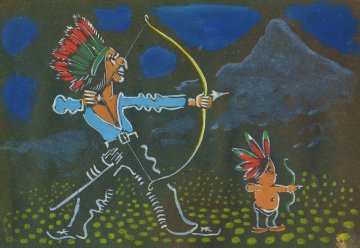Vast Alchemies: corrections and additions
Corrections
Page
16, the list of illustrations: the painting in the first
photograph, facing page 160, has been identified as “Mr Brown’s Resurrection”
which MP subsequently painted over.
Page 55: start a fresh paragraph after line 8, “a five-year course.”
Page 59, lines 8-10 and note
4 on page 234:
This painting came up for sale at Christie’s South Kensington in March 2003 and
failed to reach the vendor’s minimum. When I saw a reproduction of it, I recognized
it at once, wrote to Monica Macdonald’s son and he was able to buy it back for
his family. So that’s a happy end to a 60-year hunt for this portrait. (It
was printed in b&w on the back of PS 9:iii for October 2005, and in colour
on page 47 of Mervyn Peake: the man and his art.)
Page 104, friendship
with Walter de la Mare: It was probably de la Mare who got Peake to do a portrait of Ithell Colquhoun
in 1939, as he was an admirer of her work. The brush portrait was reproduced in
PS 4: iv (Spring 1996).
Page
108, line 4: for “to accept the some of realities” read “ to accept some of
the realities”.
Page
119, line 5: for “f^or” read “for”.
Page
125, line 26 (last line of para.): for “one hundred and forty guineas”
read “one hundred and fifty pounds”.
Page 126, line 3: for “others been” read “others have been”.
Page
137, three lines up from the foot: for “according Mervyn” read “according to Mervyn”.
Page 151, line 7: The comment between dashes should have been printed just before the parenthetical
reference at the end of the sentence (line 10), thus: “He did not know what
he would do if he heard that he had been killed. In fact, he just wanted to cry
when he thought of the stupidity of the war – and for once he gave vent to
an angry expletive (letter dated 7 March 1942; in Smith, p. 85).”
Page
163, six lines up from the foot: for “reissuing it once” read
“reissuing it at once”.
Pages
197, 214–15, and index 252: for “Carey” read “Cary” [Maddeningly, this error was introduced by the publisher between my checking the final proofs and the printing of the book. Grrr!].
Pages
203, 205 and 207: amend the running head to “1950–1952”.
Page 209, 3rd line
of 2nd para: for
“creatively” read “creativity”.
Page 210, lines
9 and 10: for “in the 1950s” read “in 1953”.
Page
215, middle: for “Mr Loftus, or A House of Air” read “Mr
Loftus, or A Horse of Air”. Until 2007, when I was permitted to view
the original MS of this play, my only source of information was Watney’s
book; it’s another of his infuriating inaccuracies. “A
Horse of Air” is a quotation from the old ballad of Tom o’ Bedlam.
Additions
Page
28 (middle): add to the paragraph ending “and writing.”:
There is even a direct allusion to the Spirit Way in Titus Groan:
the sculptures in the Hall of Bright Carvings are seen “in narrowing perspective
like the highway for an Emperor” (p. 19).
See page 59, above
Page
63, line 8: After
the word “paintings.” add a new footnote, number 9, to appear on page
235 (top):
Page
112, re the portrait of a little girl in a red dress and associated footnote (no
5):
The
sitter, Patricia Herington, made herself known to Sebastian Peake in 2004. She
was apparently playing near to the Peakes’ home when she fell and cut or
grazed her knee. Maeve called her in to bandage it and Mervyn took the opportunity
to paint her. Patricia’s parents were so impressed by the portrait that they
sent her sister round to sit for Mervyn too.
Page
146, insert at the end of the last complete paragraph:
There
is an indirect reference to this episode in Gormenghast. One of the teachers
“augmented the pall of tobacco smoke already obscuring the ceiling of the
[Professors’] Common-room with enough of his own exhaling to argue …
that the floorboards were alight” (p. 52).
Page
150, after “training” in line 13, add:
Now long since demolished, the mill was one of the largest in the area. Unlike
the shoebox shape of so many northern cotton mills, it comprised two long wings
on either side of a central structure. From contemporary photographs, I calculate
that there were about three hundred windows in the facade overlooking the river
on which sappers learned to assemble the Bailey bridge and pontoons. I suspect
that this mill helped inspire the dreaded factory whose windows, each filled with
an identical face, are reflected in the waters of a lake in Titus Alone (pp. 167–8). It certainly inspired Mervyn with powerfully negative feelings.
Start a fresh paragraph with “John Watney paints…”
Page
198, “Whizz Brown”
Back to the page for Vast Alchemies. Back to the Peake Studies home
page.
In
2005 Kit Peake decided to part with some of his uncle’s drawings, including
“Buccaneer Whizz-Brown,
The Oldest & Fastest scrum-half in the world”, “Caught
and Bowled Copperknob”, and “BOWLED!!”

